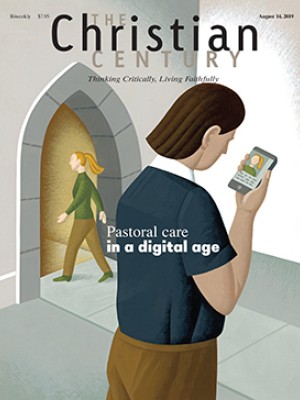Rowan Williams sees creation through the human, divine Christ
The incarnation doesn’t require a miracle; it reveals one that’s already there.
We may be accustomed to thinking of God becoming human as a miracle, an improbable outlier event of history whose very definition involves the sharpest possible contradiction between the terms it unites. But any serious belief that it has taken place involves a rethinking of those terms themselves.
Most fundamentally, incarnation requires a transformed understanding of creation. The possibility, the actuality, of divine and human becoming one had to have been “baked in” from the beginning. The New Testament therefore sees Christ as a profound commentary on Genesis, a radical redefinition of what it means for humans to bear the image of God.
Read our latest issue or browse back issues.
The Gospel of John insists that in the beginning nothing was made apart from the Word that would eventually become flesh. The world and humanity are from the start pregnant with God. Mary’s meeting with Gabriel, rather than a supernatural event of shock and awe, could seem that way only because we have grown so far out of touch with our own origins and nature.
It is no accident that the church’s first theological struggle was with Gnosticism, for it became almost immediately apparent that the central question was not how “high” one’s estimate of Jesus was, but how intimately and comprehensively God might be tied to the material world. A conventional view of creation suggests that incarnation requires a miracle; faith in the incarnation discovers that creation already was one.
Rowan Williams’s book is an extended meditation on this topic. That meditation takes the form that comes naturally to a scholar of his accomplishments: an erudite review of major figures in Christian tradition. Here Aquinas, Maximus the Confessor, and Kierkegaard (and many others) figure as familiar friends, introduced to recall their telling conversational contributions to the living tradition that Williams wants to share with his readers.
It may come as a surprise to some of those readers, searching for something new and trendy, to discover that the book retraces the issues of classic Christological and creedal theology (the Chalcedonian formula, the Nicene Creed, and the Arian controversy). Yet even someone versed in those well-traveled subjects may have a strange sensation, in which nothing familiar seems quite usual. This is because Williams does not approach the incarnation as the great unknown that has to be explained and interpreted but as the fundamental given that compels—in scripture and in theological reflection—a new understanding of nature and the normal.
The infallible index of commitment to a fully Chalcedonian Christ, Williams suggests, is a changed way of viewing the ordinary world and what is natural about it. The world and God cannot be thought apart from each other even provisionally: God cannot be just another thing in or over against the universe. This means the two cannot be competitive, in the sense that one excludes the other as an explanation for events or that the flourishing of one comes at the expense of the other.
The unity of God and Jesus is an instance of the “non-dual non-identity” that unites God with all creation. It is a unique instance, but the one that allows us to reinterpret all of nature in terms of the same metaphysical conditions revealed there. Williams explains to us, for instance, how immersion in this tradition could fund Dietrich Bonhoeffer’s particular openness to a “religionless Christianity” and a “world come of age.”
Having emphasized the learning and freshness of Williams’s writing, I will not conceal my doubt that this book will appeal to nonacademic readers. It gives some flavor of the text to note that Williams’s two primary conversation partners are not household names, the Anglican theologian Austin Farrer and the Roman Catholic theologian Erich Przywara. The author never pulls scholarly rank or uses technical vocabulary gratuitously, but neither does he back off from the complexity he regards as essential to the full scope of the truth. In this telling, that complexity is approached through a syllabus of thinkers, any one of whom can be daunting. Williams extracts from each of these figures only what is necessary for the argument, but it requires a good deal of prior knowledge to absorb those necessary components on the fly.
Though Williams’s discussion is rife with implications for our contemporary scene, his few allusions to environmental and ecological issues are not spelled out with sufficient detail or verve to serve as illustrations of his argument on their own. These cautions amount to an invitation also. For anyone who already hears music in the classic language of theology, this book will be a treat, a symphonic reminder that Christ is not a special subject but the theme by which all creation holds together.
A version of this article appears in the print edition under the title “An ordinary incarnation.”






